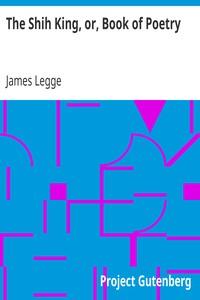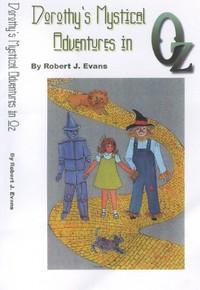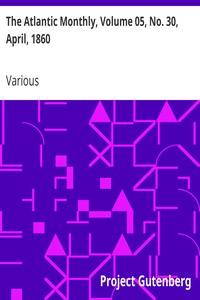Read this ebook for free! No credit card needed, absolutely nothing to pay.
Words: 43651 in 22 pages
This is an ebook sharing website. You can read the uploaded ebooks for free here. No credit cards needed, nothing to pay. If you want to own a digital copy of the ebook, or want to read offline with your favorite ebook-reader, then you can choose to buy and download the ebook.


: The Shih King or Book of Poetry From the Sacred Books of the East Volume 3 by Legge James - Confucianism; Shi jing
OF THE CLASSIC.
The meaning of the character Shih.
The character Sh?, as formed by the combination of two others, one of which signified 'a pencil,' and the other 'to speak,' supplied, we saw in its structure, an indication of its primary significance, and furnished a clue to its different applications. The character Shih was made on a different principle, that of phonetical formation, in the peculiar sense of these words when applied to a large class of Chinese terms. The significative portion of it is the character for 'speech,' but the other half is merely phonetical, enabling us to approximate to its pronunciation or name. The meaning of the compound has to be learned from its usage. Its most common significations are 'poetry,' a poem, or poems,' and a collection of poems! This last is its meaning when we speak of the Shih or the Shih King.
The earliest Chinese utterance that we have on the subject of poetry is that in the Sh? by the ancient Shun, when he said to his Minister of Music, 'Poetry is the Expression of earnest thought, and singing, is the prolonged utterance of that expression.' To the same effect is the language of a Preface to the Shih, sometimes ascribed to Confucius and certainly older than our Christian era: 'Poetry is the product of earnest thought. Thought cherished in the mind becomes earnest; then expressed in words, it becomes poetry. The feelings move inwardly, and are embodied in words. When words are insufficient for them, recourse is had to sighs and exclamations. When sighs and exclamations are insufficient for them, recourse is had to the prolonged utterance of song. When this again is insufficient, unconsciously the hands begin to move and the feet to dance..... To set forth correctly the successes and failures , to affect Heaven and Earth, and to move spiritual beings, there is no readier instrument than poetry.'
Rhyme, it may be added here, is a necessary accompaniment of poetry in the estimation of the Chinese. Only in a very few pieces of the Shih is it neglected.
The contents of the Shih.
The whole collection is divided into four parts, called the Kwo Fang, the Hsi?o Y?, the T? Y?, and the Sung.
The Kwo Fang, in fifteen Books, contains 160 pieces, nearly all of them short, and descriptive of manners and events in several of the feudal states of K?u. The title has been translated by The Manners of the Different States, 'Les M?urs des Royaumes,' and, which I prefer, by Lessons from the States.
The Hsi?o Y?, or Lesser Y?, in eight Books, contains seventy-four pieces and the titles of six others, sung at gatherings of the feudal princes, and their appearances at the royal court. They were produced in the royal territory, and are descriptive of the manners and ways of the government in successive reigns. It is difficult to find an English word that shall fitly represent the Chinese Y? as here used. In his Latin translation of the Shih, p. Lacharme translated Hsi?o Y? by 'Quod rectum est, sed inferiore ordine,' adding in a note:--'Si?o Y?, latine Parvum Rectum, quia in hac Parte mores describuntur, recti illi quidem, qui tamen nonnihil a recto deflectunt.' But the manners described are not less correct or incorrect, as the case may be, than those of the states in the former Part or of the kingdom in the next. I prefer to call this Part 'Minor Odes of the Kingdom,' without attempting to translate the term Y?.
The T? Y? or Greater Y?, in three Books, contains thirty-one pieces, sung on great occasions at the royal court and in the presence of the king. p. Lacharme called it 'Magnum Rectum .' But there is the same objection here to the use of the word 'correct' as in the case of the pieces of the previous Part. I use the name 'Major Odes of the Kingdom.' The greater length and dignity of most of the pieces justify the distinction of the two Parts into Minor and Major.
The Sung, also in three Books, contains forty pieces, thirty-one of which belong to the sacrificial services at the royal court of K?u; four, to those of the marquises of L?; and five to the corresponding sacrifices of the kings of Shang. p. Lacharme denominated them correctly 'Parentales Cantus.' In the Preface to the Shih, to which I have made reference above, it is said, 'The Sung are pieces in admiration of the embodied manifestation of complete virtue, announcing to the spiritual Intelligences their achievement thereof.' K? Hs?'s account of the Sung was--'Songs for the Music of the Ancestral Temple;' and that of Kiang Yung of the present dynasty--'Songs for the Music at Sacrifices.' I have united these two definitions, and call the Part--'Odes of the Temple and the Altar.' There 'is a difference between the pieces of L? and the other two collections in this Part, to which I will call attention in giving the translation of them.
Only the pieces of the fourth Part have professedly a religious character.
Free books android app tbrJar TBR JAR Read Free books online gutenberg
More posts by @FreeBooks


: The Atlantic Monthly Volume 05 No. 29 March 1860 A Magazine of Literature Art and Politics by Various - American periodicals The Atlantic Monthly






